From the Open-Publishing Calendar
From the Open-Publishing Newswire
Indybay Feature
Riots In The Streets and Parliament In Korea As Leader Who Stood Up To The US Is Impeached
Mr Roh's election campaign was based on the promise of better relations with communist North Korea and a more equal footing with the country's biggest ally, the US.
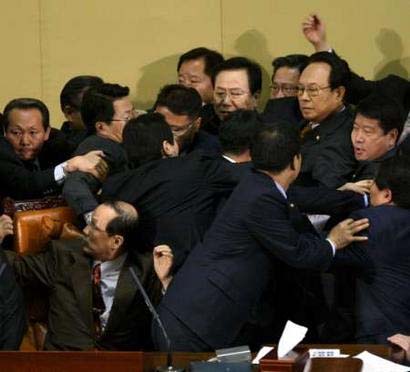
There were remarkable scenes in South Korea's parliament today as supporters of the president, Roh Moo-hyun, struggled in vain to prevent him being stripped of his powers in an unprecedented impeachment vote.
Mr Roh was forced to step down after hours of scuffles and protests both inside and outside the national assembly in the capital, Seoul.
The opposition-controlled assembly decided by 193 votes to 2 in favour of impeachment. The bill was prompted by Mr Roh's refusal to apologise for breaching a presidential impartiality law last month, when he wished his political supporters well in advance of the coming general election.
The pro-Roh Uri party, whose members had to be removed by security guards when they tried to block the vote by commandeering the podium in the voting chamber, said its 47 MPs would resign in protest.
Meanwhile, thousands of Roh supporters gathered near the assembly and the headquarters of the main opposition Grand National party to decry the impeachment as a "mutiny".
The protests culminated in one demonstrator setting himself on fire and another trying to smash his car into the assembly building.
Mr Roh's powers are now suspended pending a final ruling by the constitutional court on the vote. That process could take up to six months, during which time the prime minister, Goh Kun, will take on all presidential responsibilities.
These include his role as commander in chief of South Korea's 650,000-strong military, which is lined up against communist North Korea's 1.1 million troops across the world's most heavily armed border.
One of Mr Goh's first moves, prompted by widespread unrest over Mr Roh's impeachment, was to put the military and police on heightened alert.
"The people feel unease because the impeachment bill was passed at a time when the economy faces difficulties," Mr Goh said. "The cabinet and all government officials must do all they can to stabilise the people's lives and ensure that the country's international credibility will not be damaged."
Mr Roh's election campaign was based on the promise of better relations with communist North Korea and a more equal footing with the country's biggest ally, the US.
The decision to remove him is likely to have a negative impact on the South Korean government at a time when the country is struggling to resolve a nuclear standoff with North Korea and revive a faltering economy.
However, his 13-month tenure was dogged by corruption scandals, and today's vote was a crowning embarrassment for the feisty, independent leader.
This is the first time South Korea's parliament has impeached a president. The move came after the National Elections Commission ruled last week that Mr Roh had engaged in illegal electioneering, but that the infraction was minor and did not warrant criminal charges.
Even before the impeachment, Mr Roh's credibility had been undermined by corruption scandals within his administration. In December, three of his former aides were indicted on charges of collecting illicit funds, from Samsung, LG and other companies, for the December 2002 presidential campaign.
In a brief statement issued by Mr Roh's presidential office, the administration said it would subject itself to "the judgment of history and the people".
http://www.guardian.co.uk/korea/article/0,2763,1168226,00.html
Korea has become "a country without a president'' until the Constitutional Court makes a ruling on the impeachment motion against President Roh Moo-hyun, which was passed at the National Assembly Friday.
The motion was passed by a wide margin of 193 to 2, a stretch above the 181 necessary for a two-third majority.
This is the first time in Korea that the president has ever been impeached and it is a rare event in foreign countries as well. As a result, the people are embarrassed by the Assembly's action and worry about upcoming developments in all aspects of the nation.
Although Prime Minister Goh Kun has assumed the duties of the president, possible uncertainties in foreign relations and national security remain. It is also worrisome that the economy could be aggravated because of the damaged international credibility caused by the impeachment motion.
Prime Minister Goh will be acting president for up to six months until the Constitutional Court makes a ruling on the case, while Roh will be temporarily relieved of all the duties of the presidency after only a year and 17 days in office.
The stock market was battered with the passage of the impeachment bill, falling by more than 30 points to below the 840 level, and the value of the Korean currency against the U.S. dollar also dipped
Adding to the chaos of Roh's predicament, a former corporate leader committed suicide by jumping off a bridge into the Han River, one hour after Roh had criticized his attempt to buy influence from the president's elder brother.
Recognizing the repercussions of his gaffes, he formally apologized for all remarks related to the elections as well as for irregularities regarding his relatives and associates before leaving for the Korean Academy of the Navy yesterday morning.
But it was too late. Even the relatively minor party United Liberal Democrats was infuriated and played a decisive role in passing the bill.
The proposed impeachment bill was based on legal procedures and passed in a National Assembly vote. However, the causes for the impeachment are still weak and it is controversial whether these causes satisfy the requirements for impeachment in the Constitution.
The main reason is that President Roh made remarks in favor of the ruling Uri Party. The second reason is that Roh lost his competence to carry out state affairs as his aides and relatives were involved in influence –peddling irregularities and the third is that he has aggravated the economy and thus unnecessarily upset the people.
However, the Constitution says that the President can be impeached ``when he violates the Constitution and laws while carrying out his duties.'' It is controversial whether President Roh's remark in favor of a particular political party violates the election law, according to experts. Although the impeachment bill was passed, it was possible because three opposition parties have an absolute majority in the Assembly and they pushed ahead, they claimed.
However, the most important is what develops from now on. First of all, the government should make every effort to carry out state affairs from the dispatch of troops to Iraq to six-party talks over North Korea's nuclear program and to stabilization the life of the people.
Political parties should not take advantage of the impeachment in the upcoming National Assembly elections. Both ruling and opposition parties should not take any extreme action. The people also should not take violent actions against the parliamentary action.
The Constitutional Court should make a ruling on the motion as soon as possible to reduce any probable adverse impact stemming from the vacuum of the presidency although it may take a considerably long time. The legal period of 180 days is too long.
In particular, the opposition parties should support the prime minister acting as president in a bipartisan manner. The divisive opinions among the people created by the impeachment procedure should be eased as soon as possible.
The opposition parties should prepare for the possible impact in case the Constitutional Court rules that the cited causes are not appropriate for the impeachment.
http://times.hankooki.com/lpage/opinion/200403/kt2004031217222811300.htm
The following is a chronology of events leading to the National Assembly's impeachment of President Roh Moo-hyun yesterday.
Jan. 15 - MDP Chairman Chough Soon-young says President Roh's expression of support for the pro-government Uri Party in the April 15 parliamentary elections is reason for impeachment.
Feb. 3 - MDP Chairman Chough threatens to submit an impeachment motion if the president continues to engage in campaigning for the election.
Feb. 4 - GNP Chairman Choe Byung-yul threatens to consider all options against Roh, including impeachment, unless the president stops what Choe calls illegal campaigning and political manipulation.
Feb. 5 - MDP Chairman Chough warns that President Roh will face an unprecedented impeachment if he instigates national division and continues illegal campaigning.
Feb. 24 - President Roh expresses hope that the people give overwhelming support to the pro-government Uri Party in the April parliamentary elections.
Feb. 24 - MDP Chairman Chough says legal consideration of impeachment has been concluded and vows to push ahead with the move with public support.
Feb. 25 - The GNP reviews whether President Roh's remarks supporting the Uri Party constitute grounds for impeachment.
March 3 - The National Election Commission rules that the president violated the Elections Law by failing to maintain neutrality.
March 4 - Cheong Wa Dae says it honors the election watchdog's decision but cannot comprehend it.
March 4 - The GNP and MDP urge the president to offer a public apology and consider submitting the impeachment motion.
March 5 - MDP Chairman Chough threatens to file the impeachment motion March 8 unless the president apologizes for his violation of the Elections Law and a string of corruption scandals involving his aides as well as promises to prevent a recurrence.
March 5 - The GNP and MDP start discussions on joining forces to impeach the president.
March 6 - Cheong Wa Dae vows not to kowtow to "unfair partisan political pressure" and "tyranny."
March 7 - The GNP urges the president to first promise to ensure that similar violations do not happen again.
March 8 - President Roh refuses to give in to the threat of impeachment and vows to deal with the situation based on principle.
March 9 - The GNP and MDP submit the impeachment motion to the legislature and the Uri Party starts a sit-in on the floor of the National Assembly to block voting.
March 11 - President Roh rejects the opposition's demand for an apology.
March 11 - Opposition parties attempt to conduct a vote but Uri Party legislators physically block opposition lawmakers from doing so.
March 12 - Opposition lawmakers enter the main hall of the National Assembly and struggle with Uri Party legislators to gain control of the podium.
March 12 - President Roh offers a public apology for the ongoing political turmoil over the impeachment.
March 12 - National Assembly Speaker Park Kwan-yong invokes his right to order the physical removal of lawmakers from the podium and introduces the motion, which is passed by a 193-2 margin. (Yonhap)
http://www.koreaherald.co.kr/SITE/data/html_dir/2004/03/13/200403130036.asp
Mr Roh was forced to step down after hours of scuffles and protests both inside and outside the national assembly in the capital, Seoul.
The opposition-controlled assembly decided by 193 votes to 2 in favour of impeachment. The bill was prompted by Mr Roh's refusal to apologise for breaching a presidential impartiality law last month, when he wished his political supporters well in advance of the coming general election.
The pro-Roh Uri party, whose members had to be removed by security guards when they tried to block the vote by commandeering the podium in the voting chamber, said its 47 MPs would resign in protest.
Meanwhile, thousands of Roh supporters gathered near the assembly and the headquarters of the main opposition Grand National party to decry the impeachment as a "mutiny".
The protests culminated in one demonstrator setting himself on fire and another trying to smash his car into the assembly building.
Mr Roh's powers are now suspended pending a final ruling by the constitutional court on the vote. That process could take up to six months, during which time the prime minister, Goh Kun, will take on all presidential responsibilities.
These include his role as commander in chief of South Korea's 650,000-strong military, which is lined up against communist North Korea's 1.1 million troops across the world's most heavily armed border.
One of Mr Goh's first moves, prompted by widespread unrest over Mr Roh's impeachment, was to put the military and police on heightened alert.
"The people feel unease because the impeachment bill was passed at a time when the economy faces difficulties," Mr Goh said. "The cabinet and all government officials must do all they can to stabilise the people's lives and ensure that the country's international credibility will not be damaged."
Mr Roh's election campaign was based on the promise of better relations with communist North Korea and a more equal footing with the country's biggest ally, the US.
The decision to remove him is likely to have a negative impact on the South Korean government at a time when the country is struggling to resolve a nuclear standoff with North Korea and revive a faltering economy.
However, his 13-month tenure was dogged by corruption scandals, and today's vote was a crowning embarrassment for the feisty, independent leader.
This is the first time South Korea's parliament has impeached a president. The move came after the National Elections Commission ruled last week that Mr Roh had engaged in illegal electioneering, but that the infraction was minor and did not warrant criminal charges.
Even before the impeachment, Mr Roh's credibility had been undermined by corruption scandals within his administration. In December, three of his former aides were indicted on charges of collecting illicit funds, from Samsung, LG and other companies, for the December 2002 presidential campaign.
In a brief statement issued by Mr Roh's presidential office, the administration said it would subject itself to "the judgment of history and the people".
http://www.guardian.co.uk/korea/article/0,2763,1168226,00.html
Korea has become "a country without a president'' until the Constitutional Court makes a ruling on the impeachment motion against President Roh Moo-hyun, which was passed at the National Assembly Friday.
The motion was passed by a wide margin of 193 to 2, a stretch above the 181 necessary for a two-third majority.
This is the first time in Korea that the president has ever been impeached and it is a rare event in foreign countries as well. As a result, the people are embarrassed by the Assembly's action and worry about upcoming developments in all aspects of the nation.
Although Prime Minister Goh Kun has assumed the duties of the president, possible uncertainties in foreign relations and national security remain. It is also worrisome that the economy could be aggravated because of the damaged international credibility caused by the impeachment motion.
Prime Minister Goh will be acting president for up to six months until the Constitutional Court makes a ruling on the case, while Roh will be temporarily relieved of all the duties of the presidency after only a year and 17 days in office.
The stock market was battered with the passage of the impeachment bill, falling by more than 30 points to below the 840 level, and the value of the Korean currency against the U.S. dollar also dipped
Adding to the chaos of Roh's predicament, a former corporate leader committed suicide by jumping off a bridge into the Han River, one hour after Roh had criticized his attempt to buy influence from the president's elder brother.
Recognizing the repercussions of his gaffes, he formally apologized for all remarks related to the elections as well as for irregularities regarding his relatives and associates before leaving for the Korean Academy of the Navy yesterday morning.
But it was too late. Even the relatively minor party United Liberal Democrats was infuriated and played a decisive role in passing the bill.
The proposed impeachment bill was based on legal procedures and passed in a National Assembly vote. However, the causes for the impeachment are still weak and it is controversial whether these causes satisfy the requirements for impeachment in the Constitution.
The main reason is that President Roh made remarks in favor of the ruling Uri Party. The second reason is that Roh lost his competence to carry out state affairs as his aides and relatives were involved in influence –peddling irregularities and the third is that he has aggravated the economy and thus unnecessarily upset the people.
However, the Constitution says that the President can be impeached ``when he violates the Constitution and laws while carrying out his duties.'' It is controversial whether President Roh's remark in favor of a particular political party violates the election law, according to experts. Although the impeachment bill was passed, it was possible because three opposition parties have an absolute majority in the Assembly and they pushed ahead, they claimed.
However, the most important is what develops from now on. First of all, the government should make every effort to carry out state affairs from the dispatch of troops to Iraq to six-party talks over North Korea's nuclear program and to stabilization the life of the people.
Political parties should not take advantage of the impeachment in the upcoming National Assembly elections. Both ruling and opposition parties should not take any extreme action. The people also should not take violent actions against the parliamentary action.
The Constitutional Court should make a ruling on the motion as soon as possible to reduce any probable adverse impact stemming from the vacuum of the presidency although it may take a considerably long time. The legal period of 180 days is too long.
In particular, the opposition parties should support the prime minister acting as president in a bipartisan manner. The divisive opinions among the people created by the impeachment procedure should be eased as soon as possible.
The opposition parties should prepare for the possible impact in case the Constitutional Court rules that the cited causes are not appropriate for the impeachment.
http://times.hankooki.com/lpage/opinion/200403/kt2004031217222811300.htm
The following is a chronology of events leading to the National Assembly's impeachment of President Roh Moo-hyun yesterday.
Jan. 15 - MDP Chairman Chough Soon-young says President Roh's expression of support for the pro-government Uri Party in the April 15 parliamentary elections is reason for impeachment.
Feb. 3 - MDP Chairman Chough threatens to submit an impeachment motion if the president continues to engage in campaigning for the election.
Feb. 4 - GNP Chairman Choe Byung-yul threatens to consider all options against Roh, including impeachment, unless the president stops what Choe calls illegal campaigning and political manipulation.
Feb. 5 - MDP Chairman Chough warns that President Roh will face an unprecedented impeachment if he instigates national division and continues illegal campaigning.
Feb. 24 - President Roh expresses hope that the people give overwhelming support to the pro-government Uri Party in the April parliamentary elections.
Feb. 24 - MDP Chairman Chough says legal consideration of impeachment has been concluded and vows to push ahead with the move with public support.
Feb. 25 - The GNP reviews whether President Roh's remarks supporting the Uri Party constitute grounds for impeachment.
March 3 - The National Election Commission rules that the president violated the Elections Law by failing to maintain neutrality.
March 4 - Cheong Wa Dae says it honors the election watchdog's decision but cannot comprehend it.
March 4 - The GNP and MDP urge the president to offer a public apology and consider submitting the impeachment motion.
March 5 - MDP Chairman Chough threatens to file the impeachment motion March 8 unless the president apologizes for his violation of the Elections Law and a string of corruption scandals involving his aides as well as promises to prevent a recurrence.
March 5 - The GNP and MDP start discussions on joining forces to impeach the president.
March 6 - Cheong Wa Dae vows not to kowtow to "unfair partisan political pressure" and "tyranny."
March 7 - The GNP urges the president to first promise to ensure that similar violations do not happen again.
March 8 - President Roh refuses to give in to the threat of impeachment and vows to deal with the situation based on principle.
March 9 - The GNP and MDP submit the impeachment motion to the legislature and the Uri Party starts a sit-in on the floor of the National Assembly to block voting.
March 11 - President Roh rejects the opposition's demand for an apology.
March 11 - Opposition parties attempt to conduct a vote but Uri Party legislators physically block opposition lawmakers from doing so.
March 12 - Opposition lawmakers enter the main hall of the National Assembly and struggle with Uri Party legislators to gain control of the podium.
March 12 - President Roh offers a public apology for the ongoing political turmoil over the impeachment.
March 12 - National Assembly Speaker Park Kwan-yong invokes his right to order the physical removal of lawmakers from the podium and introduces the motion, which is passed by a 193-2 margin. (Yonhap)
http://www.koreaherald.co.kr/SITE/data/html_dir/2004/03/13/200403130036.asp
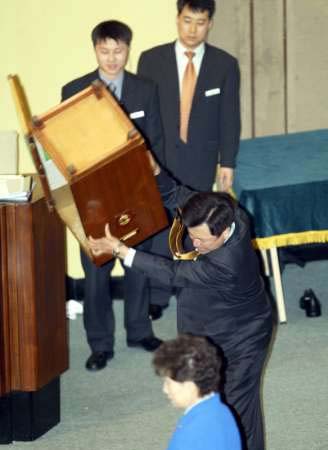
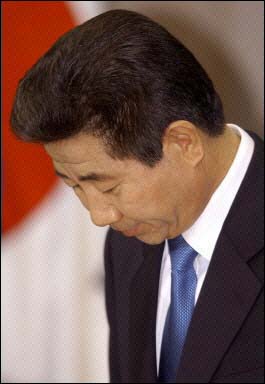
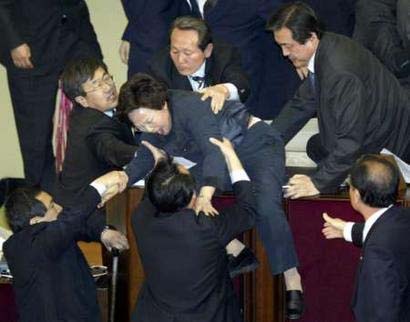
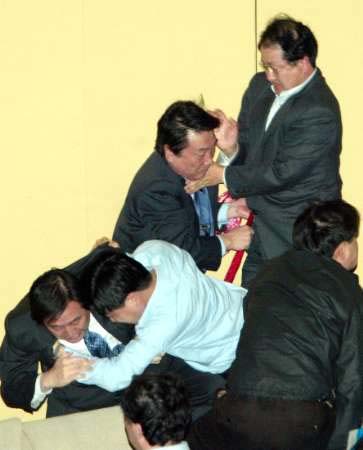
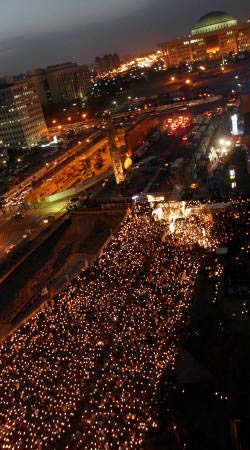
Add Your Comments
We are 100% volunteer and depend on your participation to sustain our efforts!
Get Involved
If you'd like to help with maintaining or developing the website, contact us.
Publish
Publish your stories and upcoming events on Indybay.
Topics
More
Search Indybay's Archives
Advanced Search
►
▼
IMC Network


